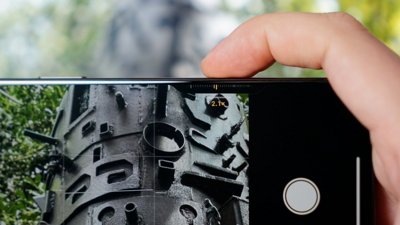Apple is looking to make it possible for iPod users to plug and then unplug their players from their PCs on the fly.
Published for the first time on Thursday, the filing lays out improved techniques for rendering a peripheral — such as an iPod or iPhone — removable from a host computer without the user first having to perform preparatory unmounting actions through software.
"In effect, the peripheral device can be automatically prepared for removal in the event that its user removes (unplugs) it from its host computer," Apple explained in the filing.
The invention calls for devices with their own means of data storage — such as iPods — to be mounted to a file system of the host computer when the host computer desires access, but otherwise to be "normally unmounted so that if the peripheral device were to be removed (e.g., unplugged) no harm or damage to data stored therein would occur."
For instance, an iPod would be accessible to the host computer during synchronization but then unmounted once synchronization has completed. "Such synchronization can be achieved in a sophisticated manner through comparison of media information" stored on both the player and the host computer, Apple said.
"After the media-based processing has been performed, the media device is logically disconnected from the file system of the host computer," the company went on to explain. "In one embodiment, this involves an 'unmounting' of the storage device of the media device from the file system of the host computer. At this point, although logically disconnected, the media device remains attached (e.g., physically connected) to the host computer."
Apple said its detection solution would effectively run a loop that periodically bounces data to determine whether the media device has been physically detached from the host computer.
"When the decision determines that the media device has been detached, then the media device processing is complete and ends as the media device has been physically detached from the host computer and thus no longer communicates with or is accessible by the host computer," the filing states. "On the other hand, when the decision determines that the media device has not been detached from the host computer, then a decision determines whether access to the media device is needed."
Apple said the invention can be implemented in software, hardware or a combination of the two. It could also be embodied as computer readable code on a computer readable medium such as read-only memory, random-access memory, CD-ROMs, magnetic tape, optical data storage devices, and carrier waves.
"One advantage of the invention is that peripheral devices, e.g., media devices, are able to be 'hot' unpluggable without data loss or corruption," Apple wrote. "Another advantage of the invention is that peripheral devices can have 'plug-and-play' as well as 'remove-and-go' characteristics which better satisfies user needs and usage."
Presently, iPod users must first prepare their players to be disconnected from their computers by unmounting them through iTunes or system software.
 Slash Lane
Slash Lane






-m.jpg)






 Charles Martin
Charles Martin
 Christine McKee
Christine McKee
 Malcolm Owen
Malcolm Owen

 Sponsored Content
Sponsored Content

 Amber Neely
Amber Neely










11 Comments
It's about damn time someone finally realizes that doing manual software actions to do a manual physical action is insane. I always understood why you had to do it, but the fact that no one could come up with a solution to fix that drove me bonkers. I hope this doesn't take long as I'm tired of doing 2 actions to eject a harddrive on a pc.
iTunes already has this. I never have to unmount my iPod. It does it automatically after sync.
i feel like my ipod has done this for a long time.
iTunes already has this. I never have to unmount my iPod. It does it automatically after sync.
But not when you enable disk use.
It's about damn time someone finally realizes that doing manual software actions to do a manual physical action is insane. I always understood why you had to do it, but the fact that no one could come up with a solution to fix that drove me bonkers. I hope this doesn't take long as I'm tired of doing 2 actions to eject a harddrive on a pc.
Windows has been able to handle hot unplugging of hard drives and flash drives for a while now. When setting up a removable drive in Windows, there are 2 options: Performance or Quick Removal. The difference is that when a removable drive is configured for Quick Removal, write caching is disabled for that drive, and you can unplug it without first having to click Safely Remove Hardware.